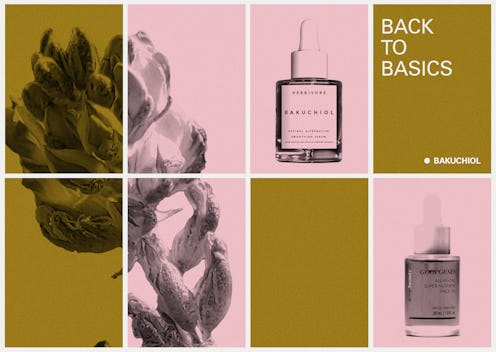(Skin)
Bakuchiol Is The Perfect Alternative To Retinol If You Have Sensitive Skin
All the benefits, minus the irritation.

With new product brands, launches, and categories popping up every day, beauty can be a bit overwhelming. Back to Basics, our rudimentary beauty series, serves as your crash course on the science behind some of the best formulations in the game.
There’s a reason why retinol is known as the gold standard of skin care — the ingredient does just about everything from reducing the appearance of wrinkles to healing acne breakouts. But, of course, the vitamin A derivative can be a bit too irritating for those with sensitive skin. With that being said, many brands are starting to use bakuchiol in skin care products as a natural, vegan alternative to retinol.
“Bakuchiol is an ancient ingredient that comes from the babchi plant, which is native to India,” Dr. Shuting Hu, a cosmetic scientist, formulator, and founder of skin care brand Acaderma, tells TZR. She notes that the seeds of the plant have been used for centuries in Ayurvedic medicine as a cure for skin disorders such as vitiligo and psoriasis. Plus, for those who tend to stay away from animal byproducts, you’ll be happy to hear that bakuchiol is a vegan ingredient (unlike most retinoids).
Dr. Dendy Engelman, MD, FACMS, FAAD, a board-certified dermatologist in New York, says bakuchiol is often used as a substitute for retinol due to the ingredient’s long history in medicine for its restorative benefits, including soothing rashes, calming redness, and healing cuts. “A 2014 study published in the International Journal of Cosmetic Science outlined how bakuchiol functions similarly to a retinol,” she tells TZR. In fact, bakuchiol has retinol-like properties, such as stimulating collagen production to create a more even-toned, bouncy complexion. “The clinical study also reported that a twice-daily application of bakuchiol for 12 weeks resulted in significant improvement in lines and wrinkles, pigmentation, elasticity, firmness, and overall reduction in photo-damage,” she adds.
Ready to learn all about the trendy ingredient? Ahead, find everything you need to know about bakuchiol in skin care.
Bakuchiol In Skin Care: The Benefits
“Bakuchiol works as an anti-inflammatory and an antioxidant, so it’s ideal for those who suffer from dry, sensitive skin and can’t tolerate a retinol,” Dr. Engelman says. She also notes that bakuchiol’s antibacterial properties makes it a great option for people struggling with acne.
Like retinol, Dr. Hu says bakuchiol triggers skin cell regeneration, which helps to reduce the appearance of fine lines and wrinkles. Additionally, the cosmetic scientist says it deeply penetrates the skin to target dark spots or hyperpigmentation. In fact, a study from the British Journal of Dermatology in 2018 reported that after using bakuchiol and retinol equally for 12 weeks, both ingredients significantly decreased the appearance of hyperpigmentation and wrinkles. However, those who used retinol in the study noted more facial skin scaling and stinging.
We still need more research on the effectiveness of bakuchiol compared to prescription retinoids, like tretinoin, (which often result in redness or peeling) but it’s safe to say that the vegan alternative is not as effective. Still, with consistent use, it might be a fair trade in order to avoid irritation.
Bakuchiol In Skin Care: How To Use It
Dr. Sonia Badreshia-Bansal, a board-certified dermatologist and RealSelf advisory board member, suggests starting out slow when using bakuchiol, especially if you have sensitive skin. Though it’s a gentler option for those with sensitive skin, it’s always good to play it safe when introducing new products into your routine. Before you begin using it, Dr. Badreshia-Bansal says it can be helpful to do a patch test behind your ear or mid-forearm, leaving the product for 24 hours. “If there’s no reaction or irritation, [you] may apply it on the face,” the dermatologist explains. “Start slowly three nights a week, moving up to daily use either in the morning or evening.”
You can use products with bakuchiol either in the morning or night, as Dr. Badreshia-Bansal notes the ingredient isn’t sun-sensitizing. “As with any product, always apply daily broad-spectrum SPF 30 for best protection,” she adds. And according to Real Simple, unlike retinol, bakuchiol doesn’t break down in the sun. Whether you choose to apply it morning or not, Dr. Engelman recommends using bakuchiol daily for optimum results.
Bakuchiol In Skin Care: Products It’s Used In
According to Dr. Yoram Harth, a board-certified dermatologist and medical director of MDacne, bakuchiol can be found in serums, lotions, and oils. “Bakuchiol serums and lotions are better for people with oily skin, normal skin, and acne-prone skin,” he tells TZR, adding that bakuchiol oils are better for those with dry skin to add a boost of moisture. “To get the expected efficacy, the concentration of bakuchiol should be between 0.5 to 2%.”
Dr. Harth says that bakuchiol works well with many ingredients, except for glycolic acid, which can degrade the bakuchiol molecule. “One of the best combinations is bakuchiol with retinol,” he notes. In fact, the dermatologist says adding these two ingredients to the same skin care routine provides better results than using each of the ingredients independently. As Dr. Mariana Vergara, NP, a cosmetic dermatologist in Los Angeles, explains, “when used together, bakuchiol’s calming properties can stabilize the retinol for it to work better and increase the skin tolerance.” So if you’re not quite ready to abandon traditional retinoids all together, rest assured that you can have the best of both worlds.
Whether you’re new to bakuchiol or already embracing the ingredient, ahead, shop serums, creams, and oils that feature the buzzy ingredient.
We only include products that have been independently selected by TZR's editorial team. However, we may receive a portion of sales if you purchase a product through a link in this article.